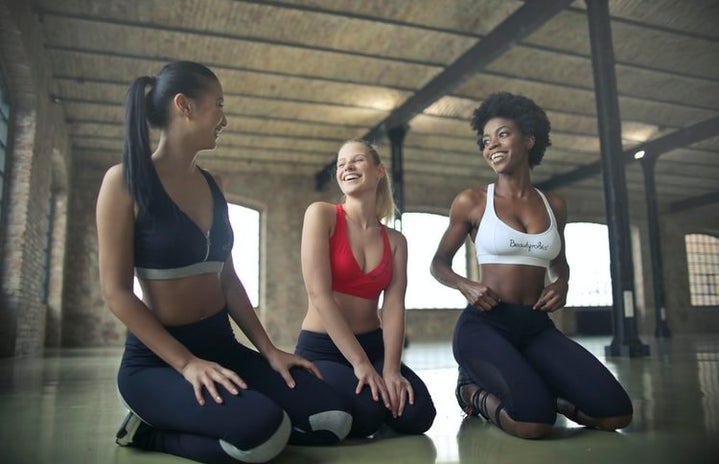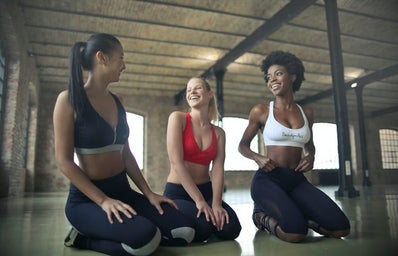With a staggering 22.2% of surveyed women claiming they’ve experienced some form of harassment at the gym, it’s no wonder Pure Gym report that 67% of women face ‘gymtimidation’ – a phrase I had never heard before writing this article, but one that will remain a solid part of my everyday vocabulary! Before signing up to the gym with a female work colleague, you could say I was definitely part of the 67%. Only attending female-orientated fitness classes like Zumba and Pilates, and generally avoiding the weights section at all costs! But as my confidence has grown in the gym environment, and I’m finally starting to overcome my gymtimidation of 15 year-old Ben on the bulk, and 60 year-old Jeff loitering round the benches, my experience has really awakened my view on other women’s experience of going to the gym, and I’m looking forward to sharing my findings.
Let’s start with the basics. Predominantly, ‘going gym’ (at least from my naïve 20 year old perspective) was definitely drilled into me to be someone who’s an avid male gym-goer, pumping weights everyday of the week, and making the gym truly part of their personality. After multiple comments towards myself and other female friends from these ‘experienced professionals’ telling us ‘girls shouldn’t train weights’ and ‘just go on the treadmill!’, I decided I wanted to make a change. These stereotypical views have evolved from many sources – whether it’s the female-focussed get fit workout videos with glowing tv personalities apparently wanting to revolutionise female fitness, or the amass of hinge boys telling us how much they can lift, these opinions continue to shape our understanding of the gym environment. The more we hear these stories, the more the ‘gymtimidation’ increases, until we end up in an ever-lasting cycle of not having enough confidence to go to the gym, to beating ourselves up for not going. Studies have shown that more women than men are registered to a gym (26% to 21%), so why is it that every time I go, whether at lunch, in a morning, or in an evening, I can just about bet money on the fact more men will be in? There clearly is a wider issue.
As I’m sure many of you have also done, when starting my so-called ‘fitness journey’, I obviously turned to TikTok – the saviour of all saviours (TikTok is honestly now my Google). On first search, my feed was filled with model-like gym girls with hourglass figures, perfectly demonstrating their protein intake, their gym routine, and their favourite machines (much to my thought process of ‘is my leg supposed to go there?’ ‘how am I supposed to fit into that?’). I should have been empowered by seeing women finessing the gym, so why did I feel overwhelmed, and almost jealous? Has society really got to the point that I’m starting to resent the women actually facing the bias head on, with soaring confidence in the weights section? The answer unfortunately, is yes. This engrained opinion that women shouldn’t go to the gym has not only affected my own confidence, but also affected how I view other women. After a few months of going to the gym, seeing other women, familiarising myself with these fitness accounts, I’m finally starting to understand and value the videos of these women, instead of just writing them off. It’s only after watching some hilarious, entertaining, and informative videos from some of my now favourite TikTokers (@nataleebfitness and @rosie.winter) that I’m eventually finding my confidence in both myself and other women. I highly recommend you watch Natalee’s series on proving no-one’s watching you in the gym – I can’t say it’s given me the confidence to sit in my Oodie eating popcorn in front of people lifting 40kg weights, but definitely close enough!
So how do we move forward? Nearly every female answering the survey suggested a female only weights section would make them feel more comfortable, and less judged or sexualised. Yet some organisations already offer this – why isn’t it enough? Many commented that their experiences in female only weights sections had been somewhat underwhelming, with an area too small to train in when busy, and not enough weights. Whilst many gyms claim they are moving forward with female experiences by incorporating these benefits, by not providing enough weights compared to the male section, this further boosts the stereotype of women should stick to cardio-based exercises. Weight training classes for women only was also a suggestion, and is definitely something I would love to take part in if it was offered!
With 83.3% of surveyed women acknowledging that seeing another female in the gym makes them feel more confident and comfortable in the environment, this has really motivated me to be that person, to be that one female that makes other girls realise gym doesn’t have to be intimidating (even if I often still feel it myself). With organisations slow to move forward with these incremental changes in the fitness environment, I hope at least just one woman reads this and realises I too have absolutely no idea what I’m doing in the gym, but I’m slowly and surely starting to disregard my own engrained stereotypes, and love it more than ever!
Source for Pure Gym and male/female split stat https://www.puregym.com/blog/uk-fitness-report-gym-statistics/
All other stats are from my own survey.
https://docs.google.com/document/d/1EtBArQPIcOzjz2Nd9k-aynjzaqqDkDKIWvBLi_Q6Xl4/edit?usp=sharing
Written by: Holly Harrison
Edited by: Ella Dayer


